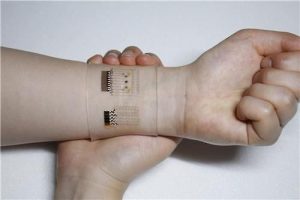Wearable patches that monitor someone’s health sound more likely to exist in a science fiction universe than ours, but thanks to science engineers at UC San Diego, this reality is not as far away as some may think. With a newly developed nanotechnology patch, people will effortlessly gain the ability to measure blood pressure, heart rate, and levels of different chemicals in the body.
Worn in a similar respect as a nicotine or hormone patch, this new soft-skin patch uses ultrasonic transducers to monitor blood pressure and heart rate. It also measures caffeine, glucose, lactate, and alcohol levels in your sweat using electrochemical sensors.
With this technology, people with blood pressure problems will not only be able to get accurate readings, but also be able to deduce whether or not the blood pressure change is a result of chemical changes in the body or other health factors. That is why scientists have chosen to measure caffeine, glucose, lactate, and alcohol, as they are all likely to affect heart rate and blood pressure changes. It can also detect sepsis, which is characterized by a blood pressure drop and a sudden increase of lactate.
This data is collected regularly and then stored onto a smartphone app which allows the wearer to monitor health over time. This information can also be sent to doctors directly so that they can keep up with high-risk patients consistently, without an appointment. This is beneficial, not only for real-time awareness but also for gathering long-term information that can be used for big-picture trigger prevention and treatment.
This technology is non-invasive and unobstructive on all fronts, making it revolutionary compared to modern long-term health-monitoring tech, which often requires wearing a bulky device or sometimes, even surgical insertion.
Understandably, the biggest roadblock for scientists was combining two tiny and sensitive technological components together without triggering compatibility problems, but with the successful development of this patch, we are likely to see a mass evolution of similar health-tech in the near future.
UC San Diego is already in the process of making more versatile patches that can monitor other health factors, and even detect different diseases. Though it is still a while away from public access, the development of this technology is sure to be a breakthrough in health monitoring.























